

Career Technical. Students utilize Photoshop, desktop publishing, writing skills, and marketing processes to develop a visually appealing magazine Students explore how a promotional ad package works by conducting research and developing marketing materials for a department at their school Students produce and record music, create a CD and accompanying materials, post their music online, and create promotional materials Students work with a partner to produce an old-fashioned radio drama or comedy to appeal to a wide demographic Students are part of a "house flip," working on a team focusing on plumbing appliances Students study traffic and pedestrian patterns in their school parking lot Students examine vapor barrier methods for use during the installation process of exterior windows and doors.
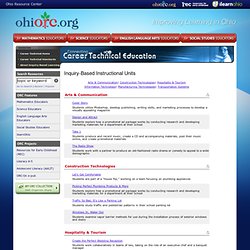
The Nature Institute - Johannes Wirz: English language Publications. Martin Wagenschein (1896-1988) was a physicist and educator.
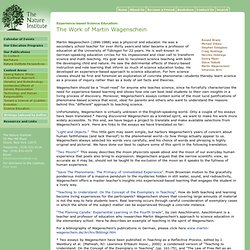
He was a secondary school teacher for over thirty years and later became a professor of education at the University of Tübingen for 22 years. He is well-known in German-speaking education circles for his impassioned and clear call to transform science and math teaching. His goal was to reconnect science teaching with both the developing child and nature. TWT: Inquiry-based Learning Strategy. What is Inquiry-based learning?
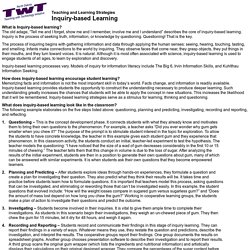
The old adage, “Tell me and I forget, show me and I remember, involve me and I understand” describes the core of inquiry-based learning. Inquiry is the process of seeking truth, information, or knowledge by questioning. Questioning! Inquiry Based Learning. Enquiry/problem-based learning. Whilst EBL has clear parallels with problem-based learning (or PBL), in that the solution of a ‘problem’ serves to shape the whole learning experience of the students, it is usually viewed as covering a broader spectrum of approaches.
Further, as noted by the HEA Guide to Curriculum Design, ‘EBL is perhaps more open to divergent ways of thinking about problems, more open to exploring and understanding different ways of perceiving the world and less concerned with providing firm solutions to problems that do not have simple or unique solutions’. (Kahn and O’Rourke 2004). This is supported by Price (2003) who notes that both approaches share a number of philosophical premises: ‘Simply put, these are that you have a great deal to gain from active study that involves you in inductive and deductive thinking and which requires that you work closely with others, within small study groups, to make sense of the practice environment and the challenges that exist there.’
(p43) What is Inquiry Based Learning? How to Study Help students learn to study well.
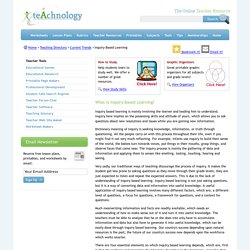
We offer a number of great resources. View Study Skills Graphic Organizers Great printable graphic organizers for all subjects and grade levels! View Organizers. WISE - Web-based Inquiry Science Environment. Educational Network Association. Read Article in Spanish Inquiry is a dynamic process of being open to wonder and puzzlement and coming to know and understand the world.

As such, it is a stance that pervades all aspects of life and is essential to the way in which knowledge is created. Inquiry is based on the belief that understanding is constructed in the process of people working and conversing together as they pose and solve the problems, make discoveries and rigorously testing the discoveries that arise in the course of shared activity. Misconception Alert “Inquiry is not a “method” of doing science, history, or any other subject, in which the obligatory first stage in a fixed, linear sequence is that of students each formulating questions to investigate.
Rather, it is an approach to the chosen themes and topics in which the posing of real questions is positively encouraged, whenever they occur and by whoever they are asked. What is inquiry-based learning? « Chip’s journey. How to: Inquiry. Will you ever just walk into class and ask, "Okay, what do you want to study today?
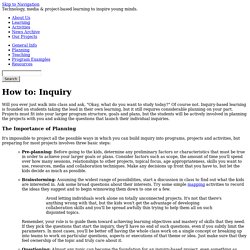
" Of course not. Inquiry-based learning is founded on students taking the lead in their own learning, but it still requires considerable planning on your part. Projects must fit into your larger program structure, goals and plans, but the students will be actively involved in planning the projects with you and asking the questions that launch their individual inquiries. The Importance of Planning It's impossible to project all the possible ways in which you can build inquiry into programs, projects and activities, but preparing for most projects involves three basic steps: Pre-planning: Before going to the kids, determine any preliminary factors or characteristics that must be true in order to achieve your larger goals or plans. Ask questions such as "Where could you find resources to answer your questions?
" Step-by-Step Through the Techniques Step 1: Posing Real Questions Step 2: Finding Relevant Resources. The Inquiry Page. Based on John Dewey's philosophy that education begins with the curiosity of the learner, we use a spiral path of inquiry: asking questions, investigating solutions, creating new knowledge as we gather information, discussing our discoveries and experiences, and reflecting on our new-found knowledge.

Each step in this process naturally leads to the next: inspiring new questions, investigations, and opportunities for authentic "teachable moments. " Inquiry-based Learning: Exploration. How do I assess students' progress?
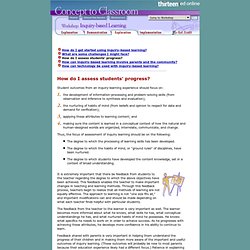
Student outcomes from an inquiry-learning experience should focus on: Thus, the focus of assessment of inquiry learning should be on the following: The degree to which the processing of learning skills has been developed. The degree to which the habits of mind, or "ground rules" of disciplines, have been nurtured. The degree to which students have developed the content knowledge, set in a context of broad understanding.
It is extremely important that there be feedback from students to the teacher regarding the degree to which the above objectives have been achieved. The feedback from the teacher to the learner is very important as well.